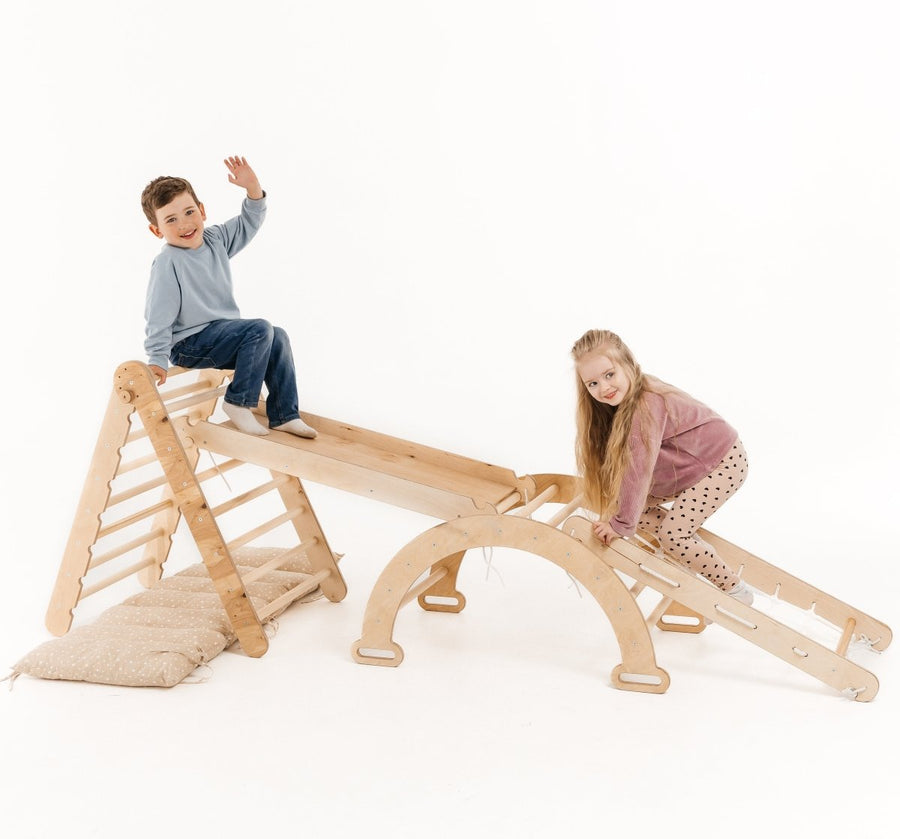How Montessori Toys Cultivate Emotional Intelligence in Children
In the modern age, as the significance of emotional intelligence (EI) becomes more evident, parents and caregivers are increasingly acknowledging its critical role in a child's overall development. Emotional intelligence isn't just about recognizing and understanding emotions. It's a multifaceted capability encompassing self-awareness, empathy, interpersonal relationships, emotional regulation, and intrinsic motivation. While traditional educational tools and methods prioritize cognitive growth, a more holistic approach considers both emotional and cognitive development as pivotal.

Enter the world of Montessori toys, masterfully designed tools that go beyond mere play. Rooted in Montessori philosophy, these toys not only stimulate a child's physical and cognitive capabilities but also play a profound role in enhancing their emotional intelligence. This article delves into how Montessori toys, particularly those from the house of Goodevas, play an instrumental role in cultivating EI in children, making them better equipped for challenges in life.

Dr. Maria Montessori, an Italian physician and educator, pioneered an educational philosophy that shifted the spotlight from rote learning to a child-centric, holistic approach. She believed that children were naturally eager learners who could initiate learning in a supportive, thoughtfully prepared environment. Over the years, the Montessori methodology has gifted the world with toys that aren't just objects of leisure but are designed to nurture a child's overall development.
Early Montessori classrooms observed children showcasing enhanced self-awareness, empathy, and cooperation when they interacted with Montessori tools and toys. It wasn't mere coincidence or isolated incidents but rather the genius behind these toys that emphasized self-directed, active learning.

The Goodevas brand, rooted in the scenic heartland of Eastern Europe, has been at the forefront of this Montessori revolution. With a vision to foster happiness, holistic health, and curiosity in every child, Goodevas toys seamlessly blend fun with function, ensuring both physical and emotional growth.
Understanding Emotional Intelligence and the Montessori Approach
Self-awareness and Montessori Toys
The very foundation of emotional intelligence is self-awareness - recognizing and understanding one's own emotions. Montessori toys, especially the climbers and playground equipment offered by Goodevas, challenge children physically. As kids navigate with such classics as the Triangle Ladder and the Arch/Rocker, or play on the swings, they become aware of their strengths, limitations, fears, and exhilarations. This self-exploration extends beyond the physical realm; children also begin recognizing their emotional responses, paving the way for a deeper understanding of themselves.
Empathy and Montessori Playsets
Empathy, the ability to understand and share the feelings of another, is cultivated in Montessori environments. Products like the Playhouses and multiple-item sets are perfect for cooperative play. When children play together, they learn to anticipate the needs of their peers, understand diverse perspectives, and cultivate a sense of camaraderie. Each shared smile, hurdle, or triumph over the Climbing Dome or while navigating the Snake Playsets allows children to develop genuine empathy.
Emotional Regulation and Montessori Principles
How do children handle frustrations, disappointments, or elation? Emotional regulation is crucial for healthy emotional and psychological growth. The Montessori methodology, with its emphasis on individualized, self-paced learning, provides ample opportunities for children to confront and manage their feelings. For example, if a child can't quite figure out the Climbing Net, they learn patience, resilience, and problem-solving - invaluable skills for regulating emotions.
Interpersonal Relationships and the World of Montessori
Montessori toys inherently promote social interaction. With products like the 5in1 Playsets or the Seesaw, children aren't just playing; they're negotiating, collaborating, sharing, and sometimes, resolving conflicts. This consistent interaction fosters essential interpersonal skills, enhancing children's ability to build and nurture relationships.
Intrinsic Motivation – The Heart of Montessori
Dr. Maria Montessori believed that children were naturally curious and motivated learners. Instead of external rewards, the joy of discovery and accomplishment becomes the driving force. This sentiment is embedded in every Goodevas product. From the thrill of ascending the Swedish walls to the satisfaction of arranging their belongings with the Montessori shelves, children learn to be intrinsically motivated, a significant aspect of emotional intelligence.

Quotes from Dr. Maria Montessori
- "The child who concentrates is immensely happy."
Imagery Description: A child deeply engrossed in arranging Goodevas' Montessori shelves, showcasing the joy of focused play.

- "The environment must be rich in motives which lend interest to activity and invite the child to conduct his own experiences."
Imagery Description: Young kids collaborating and exploring different setups using the Snake Ladder playsets, capturing the essence of a stimulating environment.

- "The first essential for the child’s development is concentration. It lays the whole basis for his character and social behavior."
Imagery Description: A toddler, eyes filled with determination, attempting to climb the Climbing Dome, representing the power of concentration.
Interesting Facts: The Bridge Between Montessori and Emotional Intelligence
- Montessori and Nobel Laureates: Did you know that both Larry Page and Sergey Brin, the co-founders of Google, attributed their success to their Montessori education? They believed it nurtured their sense of creativity and self-direction.
- Building EQ: Studies have shown that Montessori students tend to exhibit a better understanding of fairness, a sense of community, and better interpersonal skills than students from traditional educational settings.
- Timeless Teachings: The Montessori method, over a century old, remains consistent with what psychology and neuroscience suggest is an optimal environment for cognitive and emotional development.
Eco-friendly for a Better Future
Considering Goodevas' emphasis on sustainability, the eco-friendly nature of Montessori toys not only caters to a child's developmental needs but also instills respect for the environment from a young age. Using products like the eco-friendly Latvian birch plywood in their Montessori climbers or the commitment to Riga ECOlogical sustainability assures parents and grandparents that while nurturing a child's emotional intelligence, they're also contributing to a greener planet.
Conclusion: Montessori Toys - More than Just Playthings
The significance of Montessori toys goes well beyond just being objects of play. They are meticulously designed tools that encapsulate the genius of Dr. Maria Montessori’s vision, aimed at fostering self-reliance, creativity, problem-solving, and, most importantly, emotional intelligence in children. Emotional intelligence, as we understand it today, plays a pivotal role in an individual's success and well-being, influencing relationships, decisions, and reactions to the world.
By integrating Goodevas’ products into their children's lives, grandparents and parents are doing more than just gifting toys. They are investing in their child's future, providing tools that nurture essential life skills. From the Triangle Ladder that cultivates perseverance to the Montessori shelves that teach organization, these tools play a pivotal role in a child’s holistic development.
Incorporating Montessori principles using our eco-friendly products is a wonderful way to ensure that the children not only grow up respecting the environment but also nurturing their emotional well-being. As guardians of the next generation, it's heartening to see the convergence of sustainable practices and child-centric design in Goodevas' offerings.
In the end, it's all about forging a future where our children are not just academically proficient but emotionally wise, environmentally responsible, and prepared for the challenges and joys of the world. And with Montessori toys, that future seems promising.
Sources:
- Lillard, A. S. (2017). Montessori: The science behind the genius. Oxford University Press.
- Kahneman, D. (2011). Thinking, Fast and Slow. Macmillan.
- Page, L., & Brin, S. (2004). The Google Story. Delacorte Press.
- Goodevas' Brand Philosophy and Product Lineup.
- EU certification guidelines for children's wooden toys.







Leave a comment